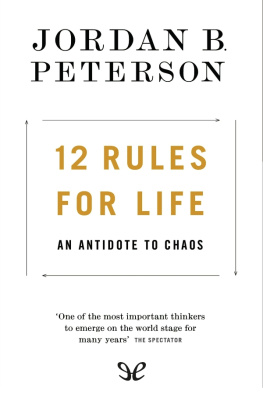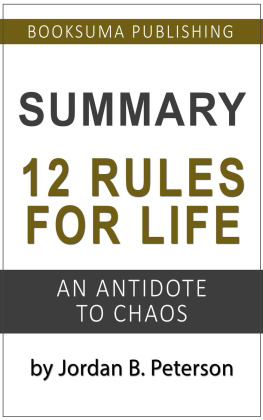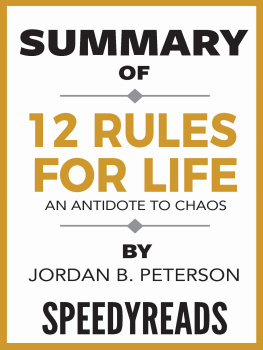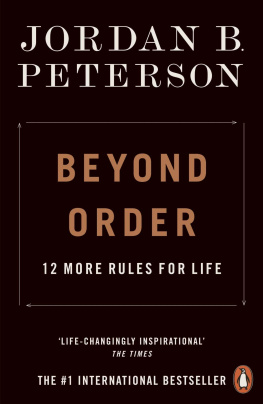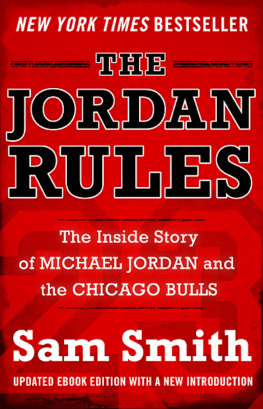Jordan Peterson - 12 Rules for Life
Here you can read online Jordan Peterson - 12 Rules for Life full text of the book (entire story) in english for free. Download pdf and epub, get meaning, cover and reviews about this ebook. year: 2018, publisher: ePubLibre, genre: Home and family. Description of the work, (preface) as well as reviews are available. Best literature library LitArk.com created for fans of good reading and offers a wide selection of genres:
Romance novel
Science fiction
Adventure
Detective
Science
History
Home and family
Prose
Art
Politics
Computer
Non-fiction
Religion
Business
Children
Humor
Choose a favorite category and find really read worthwhile books. Enjoy immersion in the world of imagination, feel the emotions of the characters or learn something new for yourself, make an fascinating discovery.
- Book:12 Rules for Life
- Author:
- Publisher:ePubLibre
- Genre:
- Year:2018
- Rating:3 / 5
- Favourites:Add to favourites
- Your mark:
- 60
- 1
- 2
- 3
- 4
- 5
12 Rules for Life: summary, description and annotation
We offer to read an annotation, description, summary or preface (depends on what the author of the book "12 Rules for Life" wrote himself). If you haven't found the necessary information about the book — write in the comments, we will try to find it.
12 Rules for Life — read online for free the complete book (whole text) full work
Below is the text of the book, divided by pages. System saving the place of the last page read, allows you to conveniently read the book "12 Rules for Life" online for free, without having to search again every time where you left off. Put a bookmark, and you can go to the page where you finished reading at any time.
Font size:
Interval:
Bookmark:
I LIVED THROUGH A TUMULTUOUS time when I was writing this book, to say the least. I had more than my fair share of reliable, competent, trustworthy people standing with me, however, and thank God for that. I would particularly like to thank my wife, Tammy, my great and good friend for almost fifty years. She has been an absolute pillar of honesty, stability, support, practical help, organization and patience during the years of writing that continued during anything and everything else that has happened in our lives, no matter how pressing or important. My daughter, Mikhaila, and my son, Julian, as well as my parents, Walter and Beverley, were also right there beside me, paying careful attention, discussing complicated issues with me, and aiding me in the organization of my thoughts, words and actions. The same is true of my brother-in-law, Jim Keller, computer chip architect extraordinaire, and my always reliable and adventurous sister, Bonnie. The friendship of Wodek Szemberg and Estera Bekier has proved invaluable to me, in many ways, for many years, as has the behind-the-scenes and subtle support of Professor William Cunningham. Dr. Norman Doidge went beyond the call of duty writing and revising the foreword to this book, which took far more effort than I had originally estimated, and the friendship and warmth he and his wife, Karen, continually provide has been very much appreciated by my entire family. It was a pleasure to collaborate with Craig Pyette, my editor at Random House Canada. Craigs careful attention to detail and ability to diplomatically rein in excess bursts of passion (and sometimes irritation) in my many drafts made for a much more measured and balanced book.
Gregg Hurwitz, novelist, screen-writer and friend, used many of my rules for life in his bestseller Orphan X, well before my book was written, which was a great compliment and indicator of their potential value and public appeal. Gregg also volunteered as a dedicated, thorough, viciously incisive and comically cynical editor and commentator while I was writing and editing. He helped me cut unnecessary verbiage (some of it at least) and stay on the narrative track. Gregg also recommended Ethan van Scriver, who provided the fine illustrations that begin each chapter, and I would like to acknowledge him for that, as well as tipping my hat to Ethan himself, whose drawings add a necessary touch of lightness, whimsy and warmth to what might otherwise have been a too-dark and dramatic tome.
Finally, I would like to thank Sally Harding, my agent, and the fine people she works with at CookeMcDermid. Without Sally, this book would have never been written.
STAND UP STRAIGHT WITH YOUR SHOULDERS BACK
IF YOU ARE LIKE MOST PEOPLE, you dont often think about lobstersunless youre eating one. However, these interesting and delicious crustaceans are very much worth considering. Their nervous systems are comparatively simple, with large, easily observable neurons, the magic cells of the brain. Because of this, scientists have been able to map the neural circuitry of lobsters very accurately. This has helped us understand the structure and function of the brain and behaviour of more complex animals, including human beings. Lobsters have more in common with you than you might think (particularly when you are feeling crabbyha ha).
Lobsters live on the ocean floor. They need a home base down there, a range within which they hunt for prey and scavenge around for stray edible bits and pieces of whatever rains down from the continual chaos of carnage and death far above. They want somewhere secure, where the hunting and the gathering is good. They want a home.
This can present a problem, since there are many lobsters. What if two of them occupy the same territory, at the bottom of the ocean, at the same time, and both want to live there? What if there are hundreds of lobsters, all trying to make a living and raise a family, in the same crowded patch of sand and refuse?
Other creatures have this problem, too. When songbirds come north in the spring, for example, they engage in ferocious territorial disputes. The songs they sing, so peaceful and beautiful to human ears, are siren calls and cries of domination. A brilliantly musical bird is a small warrior proclaiming his sovereignty. Take the wren, for example, a small, feisty, insect-eating songbird common in North America. A newly arrived wren wants a sheltered place to build a nest, away from the wind and rain. He wants it close to food, and attractive to potential mates. He also wants to convince competitors for that space to keep their distance.
My dad and I designed a house for a wren family when I was ten years old. It looked like a Conestoga wagon, and had a front entrance about the size of a quarter. This made it a good house for wrens, who are tiny, and not so good for other, larger birds, who couldnt get in. My elderly neighbour had a birdhouse, too, which we built for her at the same time, from an old rubber boot. It had an opening large enough for a bird the size of a robin. She was looking forward to the day it was occupied.
A wren soon discovered our birdhouse, and made himself at home there. We could hear his lengthy, trilling song, repeated over and over, during the early spring. Once hed built his nest in the covered wagon, however, our new avian tenant started carrying small sticks to our neighbours nearby boot. He packed it so full that no other bird, large or small, could possibly get in. Our neighbour was not pleased by this pre-emptive strike, but there was nothing to be done about it. If we take it down, said my dad, clean it up, and put it back in the tree, the wren will just pack it full of sticks again. Wrens are small, and theyre cute, but theyre merciless.
I had broken my leg skiing the previous winterfirst time down the hilland had received some money from a school insurance policy designed to reward unfortunate, clumsy children. I purchased a cassette recorder (a high-tech novelty at the time) with the proceeds. My dad suggested that I sit on the back lawn, record the wrens song, play it back, and watch what happened. So, I went out into the bright spring sunlight and taped a few minutes of the wren laying furious claim to his territory with song. Then I let him hear his own voice. That little bird, one-third the size of a sparrow, began to dive-bomb me and my cassette recorder, swooping back and forth, inches from the speaker. We saw a lot of that sort of behaviour, even in the absence of the tape recorder. If a larger bird ever dared to sit and rest in any of the trees near our birdhouse there was a good chance he would get knocked off his perch by a kamikaze wren.
Now, wrens and lobsters are very different. Lobsters do not fly, sing or perch in trees. Wrens have feathers, not hard shells. Wrens cant breathe underwater, and are seldom served with butter. However, they are also similar in important ways. Both are obsessed with status and position, for example, like a great many creatures. The Norwegian zoologist and comparative psychologist Thorlief Schjelderup-Ebbe observed (back in 1921) that even common barnyard chickens establish a pecking order.
The determination of Whos Who in the chicken world has important implications for each individual birds survival, particularly in times of scarcity. The birds that always have priority access to whatever food is sprinkled out in the yard in the morning are the celebrity chickens. After them come the second-stringers, the hangers-on and wannabes. Then the third-rate chickens have their turn, and so on, down to the bedraggled, partially-feathered and badly-pecked wretches who occupy the lowest, untouchable stratum of the chicken hierarchy.
Chickens, like suburbanites, live communally. Songbirds, such as wrens, do not, but they still inhabit a dominance hierarchy. Its just spread out over more territory. The wiliest, strongest, healthiest and most fortunate birds occupy prime territory, and defend it. Because of this, they are more likely to attract high-quality mates, and to hatch chicks who survive and thrive. Protection from wind, rain and predators, as well as easy access to superior food, makes for a much less stressed existence. Territory matters, and there is little difference between territorial rights and social status. It is often a matter of life and death.
Font size:
Interval:
Bookmark:
Similar books «12 Rules for Life»
Look at similar books to 12 Rules for Life. We have selected literature similar in name and meaning in the hope of providing readers with more options to find new, interesting, not yet read works.
Discussion, reviews of the book 12 Rules for Life and just readers' own opinions. Leave your comments, write what you think about the work, its meaning or the main characters. Specify what exactly you liked and what you didn't like, and why you think so.

